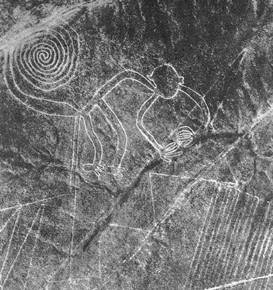Hundreds of squatters have erected new shacks on archeologically important spots in southern Peru, Peru This Week reports (based on an earlier article in the Peruvian paper El Comercio). The new settlements, which were built with the support of local politicos, have apparently endangered portions of the Nazca lines, the 1500-year-old geoglyphs that were created by an ancient Peruvian culture. The Nazca lines were designated a UNESCO World Heritage site in 1994.
Preservation of archeological sites is crucial for greater understanding of our origins and history. Nonetheless, this land invasion shows how desperate people are for a place to live. The political structure and property-owning system conspire to deny people a right to a place to call home. As a result, people often seize the most readily available land where they will be least likely to be immediately displaced--tracts with disputed titles, parcels in dangerous locations, or properties that have been removed from private development because of other concerns--in this case the need for preservation of the archeological record.
If the towns in the Nazca region would allocate other parcels for the squatters, they wouldn't have to obliterate the geoglyphs.
Wednesday, December 28, 2011
Friday, December 09, 2011
inexcusable evictions in Rio
Rio de Janeiro is using the coming World Cup and Olympics as an excuse to demolish major swathes of favelas in the Zona Sul--the tourist zone of the city. These videos--at once jaw-droppingly awful and incredibly inspiring--tell the story. Note, in the second video, about the community called Pavao Pavaozinho, that you can see the beachfront highrises out peoples' windows. This shows just how valuable the real estate is in these areas.
People have lived in these favelas for generations. The government has never cared about their lives or their communities. Now, suddenly, with the spark of development and the increase in real estate values due to the games, their communities are areas of interest. The city plans to tear down 123 areas and relocate 13,000 families (though relocation is often to the most remote areas of town, impossibly far from work and economic opportunity, and there is no compensation for the decades of commitment and labor people have put into their communities.)
The World Cup will be taking place in eight major cities around Brazil--and all of them are using the contest as an excuse to eradicate vulnerable communities. These neighborhoods are not primitive. With no investment from outside and no government assistance, people have improved their communities, going from mud and stick settlements to brick and reinforced concrete structures in one generation. They get no credit for this. In fact, it's just the reverse: they are called illegal occupiers and criminals.
Brazil has lost a major opportunity to show the world that major global sporting events can be organized in an inclusive and egalitarian manner.
(hat tip to Tanya for sending the link my way.)
People have lived in these favelas for generations. The government has never cared about their lives or their communities. Now, suddenly, with the spark of development and the increase in real estate values due to the games, their communities are areas of interest. The city plans to tear down 123 areas and relocate 13,000 families (though relocation is often to the most remote areas of town, impossibly far from work and economic opportunity, and there is no compensation for the decades of commitment and labor people have put into their communities.)
The World Cup will be taking place in eight major cities around Brazil--and all of them are using the contest as an excuse to eradicate vulnerable communities. These neighborhoods are not primitive. With no investment from outside and no government assistance, people have improved their communities, going from mud and stick settlements to brick and reinforced concrete structures in one generation. They get no credit for this. In fact, it's just the reverse: they are called illegal occupiers and criminals.
Brazil has lost a major opportunity to show the world that major global sporting events can be organized in an inclusive and egalitarian manner.
(hat tip to Tanya for sending the link my way.)
Subscribe to:
Posts (Atom)




